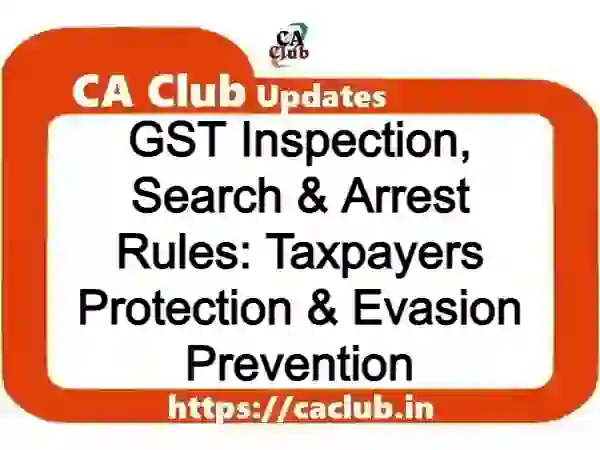Tax evasion is a menace that erodes public finances and creates an uneven playing field for honest taxpayers. The GST law provides stringent provisions for inspection, search, seizure and even arrest to tackle such issues. However, these also contain adequate safeguards to prevent harassment of genuine taxpayers. This article examines how a balance is maintained between protecting revenue and taxpayer rights under GST.
Reasons for Inspection, Search and Seizure Provisions
The GST law authorizes officers to inspect places of business, search premises and seize goods/documents in certain exceptional circumstances. This can be done if the authorized officer has reason to believe that a taxpayer has:
– Suppressed transactions or claimed excess input tax credit to evade tax
– Contravened GST provisions to evade tax
– Kept/transported goods that escaped tax payment or manipulated stock records.
Safeguards for Taxpayers
However, there are adequate safeguards for protecting taxpayer rights during inspection, search and seizure:
– Authorization required from officer not below the rank of Joint Commissioner
– Reasons for such action must be recorded in writing
– Seized records must be returned within 30 days if not relied upon
– Provisional release of seized goods subject to bond/security
– Inventory of seized goods provided to the taxpayer
– GST law mandates adherence to guidelines under Criminal Procedure Code to prevent misuse.
Detention of Goods during Transit
Goods valued over ₹50,000 under inter-state transit may be stopped for inspection of documents. Consignments can be detained or seized if found to be transported without the required e-way bill or other documents. However, if verification takes over 30 minutes, the transporter can enter details on the portal to ensure transparency and accountability.
Arrest Provisions and Safeguards
Provisions for arrest aim to tackle tax evasion by unscrupulous persons. Key aspects include:
– Arrest only allowed for specified offences involving evasion over ₹2 crore
– Repeat offenders can be arrested for such offences, irrespective of amount
– Arrests only with prior authorization from Commissioner
– Offences involving amounts between ₹2-5 crore are bailable while above ₹5 crore are non-bailable.
Thus, adequate safeguards prevent misuse of arrest provisions while still acting as an effective deterrent for tax evaders.
Conclusion
The GST law aims to strike a balance between safeguarding government revenue through deterrence of tax evasion while also protecting the rights of taxpayers. The stringent provisions for inspection, search, seizure and arrest are accompanied by adequate safeguards and checks to prevent their misuse. This ensures fairness in implementation and creates trust between taxpayers and tax authorities.
CBIC Information Brochure on GST Inspection, Search & Arrest Rules (Nov. 2023)
